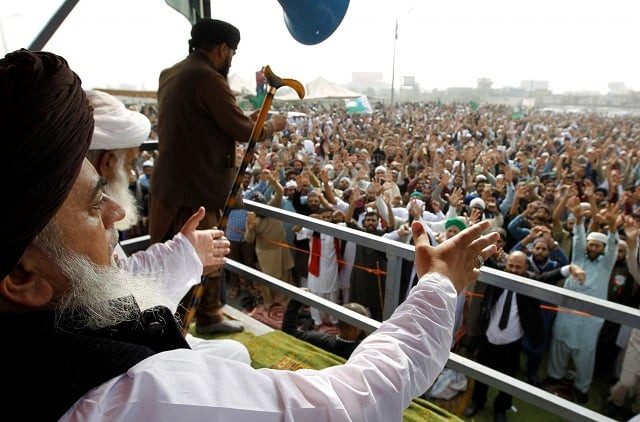Our collective failure
Sit-in by 2 religious groups begs some serious questions about our collective failure to control handful of zealots

Khadim Hussain Rizvi, leader of the Tehreek-e-Labaik Pakistan leads members in shouting slogans during a sit-in in Rawalpindi, November 10, 2017. PHOTO: REUTERS
The sit-in by two religious groups begs some serious questions about our collective failure to control a handful of zealots. It is also a manifestation of the fact that since the ruling elite was not directly affected by road closures, hence the slow government response. The PM has the privilege of using a chopper to avoid the traffic mess. The army chief can also take the aerial route to shuttle between Islamabad and Rawalpindi. But tens of thousands of common citizens do not have the same privilege as they had to endure the excruciating pain of long stretches of traffic jams for almost two weeks. Just imagine had protesters blocked the road leading to the PM office or ministers’ colony or judges’ enclave or generals’ bungalows, would the response from the state machinery have been the same? Certainly not. The crux is that as long as the ruling elite and privileged class is not affected by the chaos, the state apparatus would not move swiftly.
The apathy is ironic given the fact that the protest in Islamabad represents the extremist ideology that our leadership often pledges to confront. If a cleric repeatedly incites people to violence, uses abusive language and makes a mockery of the rule of law is not extremism then what else is? This situation warranted a joint response from the civil and military leadership. The National Security Committee, the highest consultation and decision-making forum of the civilian and military authorities, met in Islamabad while the protest was still going on. They issued a detailed statement talking about both internal and external security challenges. But surprisingly the civilian and military hierarchy did not feel the need to say a word or two on the sit-in in the capital’s heart. The absence of such a policy reinforced the perception that some hidden forces were behind these two religious groups. The IHC judge even alluded to this apprehension when he observed: “It appears that the sit-in has been facilitated to put the country into crises.”
The role of opposition parties, including the Pakistan Tehreek-e-Insaf, which is otherwise quite vocal in making policy statements on issues of national importance, was also pathetic. The silence on the part of opposition parties appeared to be deliberate since they view the sit-in through the narrow lens to score brownie points against the government. The Pakistan Muslim League-Nawaz is not going to stay in power forever. But the phenomenon of extremism and fanaticism will continue to test its successors for many terms. Therefore, instead of playing politics, all parties should have backed the government in the face of few individuals. Some issues are supposed to be above politics.
Apathy of the state institutions and political parties aside, the masses are also equally responsible. For so long we have tolerated both religious zealots and inaction of state institutions. It is the passive approach of the silent majority that allows a handful of people to thrive. There has been public outcry on the social media but that is inconsequential. Sometimes it becomes necessary to express sentiments through the show of power on the streets for the right cause. Remember how a million-march in central London during Iraq war compelled the British government to review its strategy. More recently, the Turkish masses came on the roads in big numbers to thwart a coup attempt in their country. It is time that we stood up against few individuals who are bent on imposing their views on the majority. It is time that we stood up against the callous attitude of state institutions, or else brace for more sufferings.
Published in The Express Tribune, November 19th, 2017.
Like Opinion & Editorial on Facebook, follow @ETOpEd on Twitter to receive all updates on all our daily pieces.















COMMENTS
Comments are moderated and generally will be posted if they are on-topic and not abusive.
For more information, please see our Comments FAQ